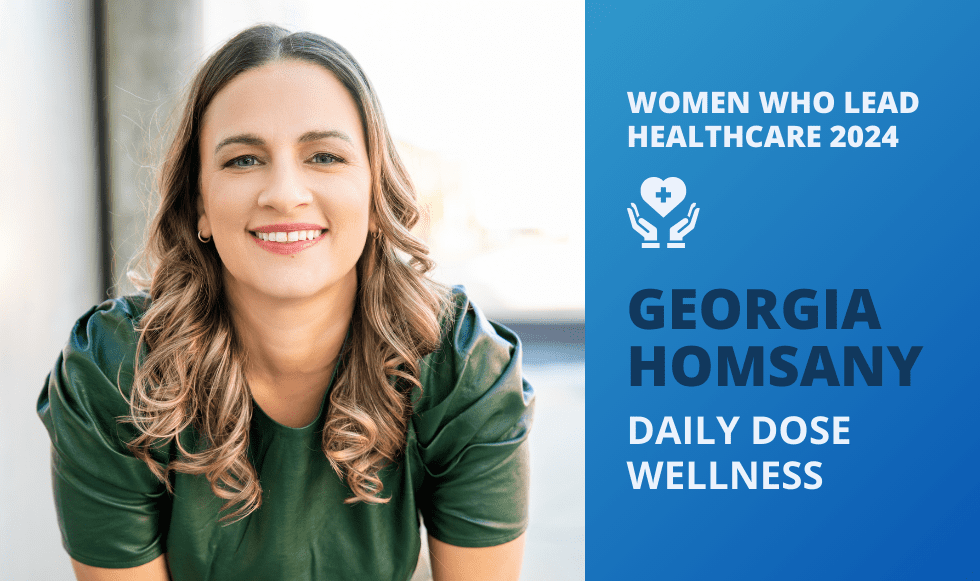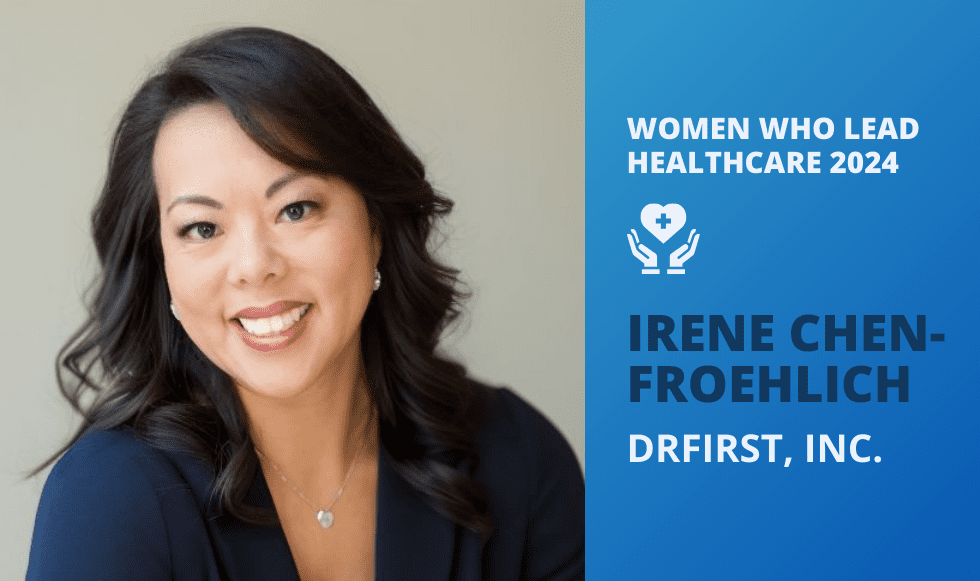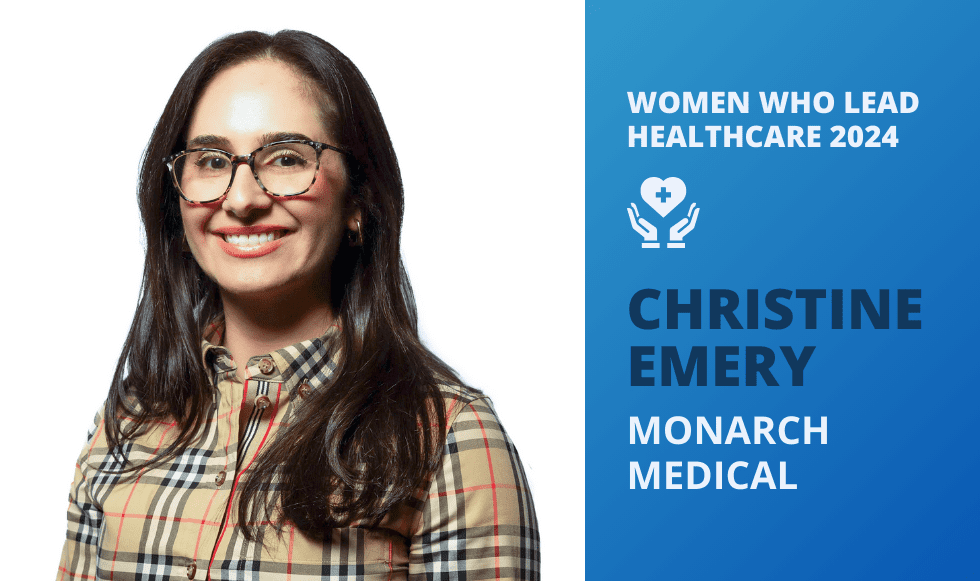
by Sharai Lavoie | Jan 22, 2025 | Women Who Lead
Workplace burnout has become increasingly common, but Georgia Homsany turned her personal experience into a powerful mission to help others. As founder and CEO of Daily Dose Wellness, she’s revolutionizing how companies approach employee well-being, proving that career pivots can lead to meaningful impact.
Finding Purpose Through Personal Experience
Georgia’s journey to founding Daily Dose Wellness began with her own corporate burnout experience. “I had personally reached a point of burnout at the company I was at, and I didn’t want to just get another job in marketing,” she shares.
This pivotal moment led to a career shift at age 38 – a decision that, while daunting, aligned with her passion for wellness and desire to create positive change in the corporate world.
“I had this idea that there are so many people that are probably feeling the way I had felt,” Georgia explains. “My thought was: why not take something that I’m passionate about and apply it in the business setting? I had felt like there were a lot of resources for individuals to do on their own, but not as much support available in the workplace, where we spend most of our day.”
Building a Business During Unprecedented Times
Starting a business at the onset of the COVID-19 pandemic presented unique challenges, but Georgia’s perseverance proved stronger. As a “one-woman show,” she handles everything from sales outreach and marketing to moderating webinars and working directly with clients.
Daily Dose Wellness provides organizations with wellness breaks through 30-minute webinars, 30-day challenges, and virtual health fairs – all designed to help employees stay productive and prevent burnout.
“I started a business at the start of the pandemic so I was already going up against a lot,” Georgia reflects. Her strategy for overcoming obstacles? “You have to think about whether this is something you genuinely want to do and then make sure you are celebrating the wins, no matter how small they feel in those moments.”
The Power of Positive Feedback and Personal Growth
Georgia’s commitment to making a difference is reinforced by the impact she sees in people’s lives. “Whenever I receive feedback, I tell myself, if I help one person in each program or interaction I have, then my job is done,” she says. She keeps a “power jar” – a practice learned from her business coach – where she collects positive feedback about her work.
“When you’re in those moments feeling challenged or thinking maybe you did the wrong thing or want to give up on the business… that power jar comes in handy because you can read all those positive statements of who you inspired or helped and it reminds you why you’re doing the work you’re doing.”
Finding Balance and Setting Boundaries
As someone who helps others achieve work-life balance, Georgia practices what she preaches. She advocates for thoughtful choices about commitments: “Do what you want to do. Which sounds obvious, but you’d be surprised how many people are just filling their calendar with things they feel like they have to do or they should do.”
She emphasizes the importance of making gradual changes rather than dramatic ones, suggesting that people “start making micro changes” when establishing new boundaries or habits.
Embracing Change and Following Intuition
For women considering career changes, Georgia emphasizes the importance of trusting one’s intuition. “I think women especially, we’re very good at having that intuition. And, when something doesn’t feel right in our gut, it’s usually spot-on,” she advises. This wisdom led to her publishing a book earlier this year titled “You’re Not Lazy: Change Your Words to Change Your Worth,” focusing on transforming negative self-talk into confidence-building dialogue.
She finds inspiration in successful women who found their path later in life, particularly author Jen Sincero. “One thing I was inspired about personally with Jen is that she says in her book how she didn’t really ‘make it’ until her 40s… that gave me hope because as someone who switched career paths at 38 years old, you wonder, can I actually make a living now starting something new?”
Looking to the Future
Georgia’s vision extends beyond individual success. “My overall goal is to get wellness into as many companies as possible,” she states. Her approach focuses on proactive wellness rather than reactive solutions: “What are little changes that you can start to incorporate in your day that you feel are feasible that will put those healthy habits in place that you can stick with in the long run?”
Through her work at Daily Dose Wellness, speaking engagements, and her book, Georgia continues to champion workplace wellness while inspiring others to pursue their passions, regardless of age or career stage.
Her journey serves as a testament to the power of perseverance and the impact one person can have when they choose to follow their intuition and pursue meaningful change.

by Sharai Lavoie | Jan 22, 2025 | Women Who Lead
In healthcare technology, leaders who can adapt and grow while staying true to their values are rare gems. Irene Froehlich, Chief Brand Officer at DrFirst, embodies this ideal balance through her remarkable 25-year journey from graphic designer to executive leadership. Her story is one of continuous growth, adaptation, and the courage to embrace vulnerability in leadership.
A Legacy of Innovation and Determination
Born to immigrant parents from Taiwan and Cambodia, Irene’s foundation for success was built on her father’s entrepreneurial spirit and her mother’s high expectations. “My dad is a serial entrepreneur… he always believed that I could do anything,” she reflects, “he didn’t let all those challenges or barriers prevent him from being successful.”
Her entry into healthcare technology was inspired by her mother’s experiences as a nurse, where she witnessed firsthand the inefficiencies plaguing the healthcare system. “Twenty-five years ago… they didn’t have Internet in the practices…patients didn’t have access to their records,” she recalls, highlighting the motivation behind her work to integrate and streamline healthcare technology.
A Multi-Faceted Career Journey
Irene’s path at DrFirst has been an impressive feat. She has held numerous leadership positions, including head of sales, head of account management, and oversight of talent acquisition and marketing. “I have worn almost every hat at DrFirst for a period of time,” she notes, attributing this versatility to her strength as a “crisis fixer.”
Her current role as Chief Brand Officer encompasses not just brand management but also cultural leadership, particularly crucial in today’s remote workplace environment. “I am still in charge of the company’s vision and the brand, but I also help with the culture to ensure that the entire company, especially in a remote workplace, is still connected and gelling together,” she explains.
Making an Impact in Healthcare
At DrFirst, Irene leads initiatives that address critical healthcare challenges. “We work with patients, hospitals, doctors, pharma,” she explains. Her work focuses on making specialty medications more accessible, improving patient education, and creating more affordable healthcare options.
“We look at where all the holes are in healthcare and we fill them up,” she explains. “A lot of other companies do one or two things, but we do the holistic thing because we look at the big picture and we say, ‘Okay, where are all the places not working well together? And how do we unite those things together?’”
Overcoming Challenges and Learning to Lead
Irene’s journey wasn’t without its struggles. Early in her career, she faced significant opposition as a young woman in a male-dominated industry. “I was a little bit of a bulldog,” she admits. “Here I was, 24 years old, 23 years old, basically telling everybody where they needed to go… it caused a lot of friction.”
Over time, Irene developed a more collaborative approach. “When you ask questions, you understand their perspective… assuming positive intent, people will see that you’re really trying to get on the same page with them and they become a lot more open and vulnerable,” she reflects.
Personal health challenges further aligned Irene with the mission of DrFirst: “I myself have chronic health conditions and I’ve seen how difficult it is for patients…We can be a part of helping to make that much more seamless and much more efficient.”
Redefining Success and Balance
These health challenges also prompted Irene to reevaluate her approach to work-life harmony. “When I was younger, all I cared about was getting to the next level. I was working 80-hour weeks,” she shares. Her health conditions taught her the importance of delegation and trust, leading to a more sustainable leadership style.
“I say harmony instead of balance because I think balance makes people feel guilty,” she explains. “If you’re an executive, you are typically very passionate about the work you do… it doesn’t feel like work.” This perspective has led her to embrace a more holistic approach to success, including community involvement and charitable activities.
Inspiring the Next Generation
Irene is passionate about encouraging women to pursue leadership roles in healthcare. “I really want to inspire women in healthcare to break through barriers and do it without sacrificing authenticity,” she says.
She particularly emphasizes the importance of taking risks: “Women have a tendency to not apply for those jobs unless they’ve done it and then done it exceedingly… I would encourage them to pursue leadership roles, lean into their intuition, and try things that they’ve never done before.”
Advice for Future Leaders
Her advice to aspiring leaders is deeply personal and practical:
- Embrace vulnerability: “The more you say, ‘Hey, I don’t know this. Can we collaborate?’ the more that you say, ‘You have a strength in this area. Can you educate me?'”
- Take care of your health: “Your health is your most valuable asset. If you don’t have that, it doesn’t matter about anything else.”
- Ask for help: “Trust is actually from asking for help. When you ask people, they feel good about themselves.”
- Stay authentic: “Don’t allow success to rob you of your peace of your joy.”
Looking Forward
Irene Froehlich’s approach to leadership, combining technical expertise with emotional intelligence and authenticity, represents the future of healthcare technology leadership – one that values both progress and human connection.
“Think about success from the standpoint of what is the ripple effect that you are doing to create a way or pave the way for compassionate leadership for inclusivity,” she concludes, embodying the kind of leadership that will continue to shape and improve healthcare technology for years to come.

by Sharai Lavoie | Jan 22, 2025 | Women Who Lead
From the age of five, Dr. Jessica Mendelsohn knew her calling was medicine. Her childhood declaration to her parents wasn’t just a passing fancy, but a profound insight into her future path. “I always knew it’s what I wanted to do,” she reflects. “I think it’s in my blood.”
An Unexpected Pathway to Medicine
No one in her immediate family worked in traditional medical roles. With only a younger cousin who is a nurse, her inspiration came from a less conventional exposure to healthcare. This unconventional background didn’t deter her; instead, it fueled her determination to carve her own path in the medical field.
The Heart of Healthcare: Human Connection
At the core of Dr. Mendelsohn’s practice is a profound belief in human connection. “The people,” she emphasizes, are the most rewarding aspect of her work. Her approach goes beyond traditional medical care, focusing on partnership rather than simply “fixing” health issues. “We’re able to talk to the public, learn their stories, understand what’s going on with their health, and be able to work with them as partners towards better health,” she explains.
Reimagining Primary Care
Dr. Mendelsohn’s direct primary care practice, New South Family Medicine and MedSpa, represents a radical departure from traditional healthcare models. By eliminating insurance companies from the equation, she’s created a patient-centered approach that prioritizes individual care over bureaucratic constraints. “Patients pay us directly, and we are not involved with an insurance company or third-party paying us,” she explains.
This model allows for deeper patient relationships, longer visits, and a more personalized approach to healthcare. Her ultimate goal is ambitious: to demonstrate a better way of practicing medicine and receiving healthcare in the primary care space.
Navigating Professional Challenges
Dr. Mendelsohn is candid about the additional challenges women face in the medical profession. “As a woman in healthcare, as a woman physician, our thought process is different,” she observes. “We have to perhaps work a little bit harder than our male colleagues to get to the same place.”
Her strategy for overcoming these challenges is rooted in a growth mindset. She views obstacles not as insurmountable barriers, but as opportunities for learning and growth. “Either you succeed, or you learn,” she says.
Blending Personal and Professional Life
Contrary to traditional notions of work-life balance, Dr. Mendelsohn sees her professional and personal lives as deeply interconnected. “There is no balance,” she candidly shares. Instead, she focuses on being present in the most important moment at hand, whether that’s responding to her children’s needs or addressing a patient’s health concerns.
She even involves her family in her professional journey, making her practice “part of our family” and using it as an opportunity to teach her children about community impact and professional dedication.
A Lifelong Learning Journey
Dr. Mendelsohn credits her current success to the cumulative experiences throughout her career. Opening her practice without prior business experience was daunting, but her previous work in large healthcare systems provided crucial insights. “I don’t know that I would have had the understanding on a more global aspect of what influence I can have in healthcare if I hadn’t gone through all of that prior,” she reflects.
Message to the Next Generation
Her advice to young professionals, especially women in healthcare, is profound: “Don’t lose sight of all the incredible things that you are.” She encourages embracing multiple facets of identity, recognizing that a career in healthcare is important, but not the sole definition of one’s self.
Wisdom for Her Younger Self
If she could send a message to her younger self, it would be: “Don’t change a thing, and don’t think so far into the future that you miss the present.” She emphasizes the importance of pausing, breathing, and acknowledging one’s accomplishments along the way.
The Power of Perseverance
Dr. Jessica Mendelsohn’s journey is a testament to the power of perseverance, passion, and purpose. Her story demonstrates that success is not about avoiding challenges, but about learning, adapting, and remaining committed to your passion.
“In the words of Robyn Arzon, ‘You’ve made it through 100% of your bad days.’” To Jessica, this resonates as a powerful reminder of human resilience and the potential for growth, even in the face of significant obstacles.
By sharing her story, Dr. Mendelsohn isn’t just inspiring the next generation of healthcare professionals – she’s actively reshaping the landscape of patient care, one patient and one practice at a time.

by Sharai Lavoie | Jan 22, 2025 | Women Who Lead
When personal experience meets professional expertise, transformative healthcare solutions are born. This is exactly what happened with Supriya Laknidhi, CEO and co-founder of Cerula Care, a pioneering virtual behavioral health platform supporting cancer patients through their treatment journey.
Building Bridges in Healthcare
With two decades of experience in healthcare, including leadership roles at United and Aetna/CVS Health, Supriya identified a critical gap in cancer care. Her company, Cerula Care, provides comprehensive virtual behavioral health support as an extension of oncology teams, addressing a need that affects over 85% of cancer patients.
“We provide a care team with virtual visits, inclusive of counseling, holistic health coaching, and psychiatry, very specific to people who are going through the cancer journey,” Supriya explains. The team receives referrals directly from oncologists and spends approximately an hour and a half with each patient monthly, focusing on understanding their emotional state and building trust.
“We’re really getting a sense of what their barriers are for optimal care,” she says, “and then we’ll work with them partly on the counseling and psychiatry as needed, but spend a lot of our time giving them the tools and skills to help alleviate the barriers.” The impact of their work resonates deeply with patients, as one member shared: “We helped her feel like a real person at a time in her life where she didn’t even have a sense of self.”
Personal Journey Shapes Professional Mission
Supriya’s path to healthcare innovation was influenced by both professional experience and deeply personal circumstances. As the mother of a child with autism and a daughter to aging parents, she witnessed firsthand how physical health challenges often intersect with mental health needs.
Early Foundations of Leadership
Supriya’s leadership journey began in a supportive household that fostered confidence and ambition. “I grew up in a house where my parents gave me all of the confidence that I ever needed in order to just go pursue whatever I wanted to pursue,” she reflects. As an only child, she was raised in an environment where excellence was expected and success was the only option. This foundation, combined with a strong emphasis on education, helped shape her future approach to leadership and innovation.
Navigating Career Challenges with Resilience
Like many leaders, Supriya’s career hasn’t been a straight upward trajectory. She describes careers as “jungle gyms” rather than ladders, acknowledging that not every situation will be the perfect fit. She recalls a particularly challenging time when a supportive executive left, leaving her innovative project without crucial backing.
The experience taught her valuable lessons about resilience and perspective. “When you’re facing a challenging part of your career, think about it as a point in time, and don’t make it a very personal thing,” she advises.
Balance and Well-being: A Leader’s Perspective
As a mother of two children, ages 10 and 8, Supriya emphasizes the importance of self-care in leadership. “If I’m not there for myself in the way that I need, it’s really hard for me to be amazing for others,” she shares. She maintains balance through running, which serves as her form of meditation, and setting boundaries between work and family time.
“Dinner time and bedtime, I still have young kids. I’m not checking email (but of course my team can reach me if absolutely needed). My team knows that. Weekends for the most part, same thing,” she explains. “Some of this is just being pretty strict about taking the time that you need for yourself and for your family.”
Breaking Stigmas and Creating Change
At Cerula Care, Supriya’s team is tackling the stigma around mental health through an innovative approach. By integrating behavioral health support into cancer treatment, they’re making mental health care more accessible and acceptable. “When someone is diagnosed with cancer… all of a sudden the stigma of having a mental health person in your team by your side decreases,” she explains.
This approach often serves as an entry point for broader mental health support: “What we’re finding is a lot of people do come in and then we know and they know that they probably should have had mental health services before. There’s probably underlying anxiety or depression that’s been there for a while and it’s almost like sometimes we’re their first door in and that’s okay.”
The Power of Mentorship
Early in her career, Supriya found inspiration in a female mentor who significantly shaped her professional journey. Working in banking in New York City, she encountered a remarkable woman leader who stood out in a male-dominated environment. “She was instrumental for me in my career going forward,” Supriya recalls.
“There were many times where she was able to be pretty honest with me if maybe a promotion didn’t happen because there’s inherent bias and how we can work through that and what we should do.”
This mentor not only provided professional guidance but also demonstrated how to balance a successful career with family life, serving as a powerful role model for Supriya’s own journey.
Inspiring the Next Generation
Drawing inspiration from her early career mentor, Supriya is passionate about supporting the next generation of women in healthcare. “Inspiring the next generation of women is one of the reasons I wake up every single day and come to work,” she shares. She emphasizes the importance of personal connections and leading by example, demonstrating that it’s possible to balance a successful career with family life.
Wisdom for the Journey
When asked what message she’d send to her younger self, Supriya offers wisdom that resonates with all healthcare leaders: “The career is long. Not every part of it is going to be amazing, but lots of it is going to be fantastic.”
She emphasizes that she’s still learning and growing, noting that as a first-time founder, “I am my younger self all over again, doing something for the first time and learning every single day.”
Her final piece of advice encapsulates her leadership philosophy: “Handle everyone that you work for with grace and respect and be true to who you are and connected with them. That makes a career wonderful even through the jungle gyms of a career.”
Through her leadership at Cerula Care and her commitment to breaking down barriers in healthcare, Supriya Laknidhi exemplifies the perseverance and innovation that drive positive change in the healthcare industry.

by Sharai Lavoie | Jan 22, 2025 | Women Who Lead
In the dynamic world of healthcare technology, Christine Emery stands as a testament to the power of perseverance and adaptability. As a nurse turned healthcare technology leader, her journey exemplifies the spirit of innovation and resilience that defines the Women Who Lead Healthcare initiative.
From Bedside to Business
Christine’s path in healthcare began in 2010 when she graduated nursing school and dove straight into critical care. “I really enjoyed caring for those high acuity patients,” she reflects. “The more drips and infusions, the more fun and challenging the work.” Her natural aptitude for mathematics and science, coupled with her father’s encouragement, led her to pursue nursing – a decision that would shape her future in unexpected ways.
During her time in the ICU, Christine quickly distinguished herself as a leader. “After being a nurse in the unit for about a year, I became a preceptor helping new unit nurses onboard to our high acuity patient population,” she explains. She found particular fulfillment in mentoring new nurses, teaching them critical thinking skills, and helping them navigate complex patient care scenarios.
Transitioning to Healthcare Technology
After seven years of intensive care experience, Christine made a pivotal career shift when an opportunity in the healthcare technology industry presented itself. Now at Monarch Medical Technologies for over four years, she has carved out a unique role that combines clinical expertise with business acumen.
“My role is a blend of clinical, business, and sales, which is fun and challenging,” she shares.
As a Customer Success Manager and Team Lead, Christine’s responsibilities are multifaceted.
“My primary objective in my role is to partner with my client base by helping them understand the functionality of our solutions, evaluating their glycemic metrics, and being able to focus on opportunities for learning and growth while still fostering continued success,” she explains. In July 2023, she took on additional leadership responsibilities as the team lead for her department.
Overcoming Career Setbacks with Grace
Christine’s journey hasn’t been without its challenges. Early in her transition to the medical device industry, she faced a significant setback when company restructuring led to widespread layoffs.
“That was very hard to absorb because I’ve always been an overachiever and a hard worker,” she shares. Rather than letting this derail her ambitions, she used the experience as a catalyst for growth.
During this period, she dedicated herself to applying for other medical device positions, using each interview as a learning opportunity. “I actually learned a lot from several of those clinicians I interviewed with, even though I did not get the job. I learned a lot about developing client rapport and portraying confidence,” she reflects. These skills would prove invaluable in her future roles.
Breaking Through Personal Barriers
Perhaps one of the most striking aspects of Christine’s journey is her transformation from a reserved student to a confident healthcare leader. “If you had told me in high school that I would be presenting on a regular basis in front of important hospital system stakeholders, I would not have believed it,” she admits. “I was the timid student who would gladly have done all the work if someone else would present the content.”
Today, she has worked hard to develop her professional presentation skills, regularly conducting presentations and handling complex clinical questions in real time. This growth mindset extends to all aspects of her work: “You can always learn new skills and work hard to become an expert.”
The Impact of Education and Mentorship
Christine’s educational background at Bob Jones University provided her with more than just clinical knowledge. “Having that liberal arts education really did allow me to have a wide variety of vast knowledge of different topics,” she notes. One particularly impactful lesson from her education continues to guide her work:
“You never want to put yourself in a position where people will question if you did something right or wrong. Always put yourself in a position where you showed that you did right and you did it to the best of your ability.”
Cultural Heritage and Professional Identity
Beyond her professional achievements, Christine maintains a deep connection to her heritage, speaking Spanish daily with her 90-year-old grandmother, who immigrated from Cuba in the 1970s. “She’s my hero and I am in awe of her sacrifice that allowed me to pursue a career where I can help others,” Christine shares.
This bilingual ability has enhanced her capacity to serve diverse patient populations throughout her career, particularly during her bedside nursing days when she was often assigned Spanish-speaking patients.
Contributing to Healthcare’s Future
In her current role, Christine continues to drive positive change in healthcare by leveraging her bedside nursing experience to improve clinician workflows and reduce nursing workload burdens. “When you think about how nursing staffs the majority of the hospital, the experience that I have working at the bedside, bringing that into healthcare will help shed some light for a lot of other departments,” she explains.
Words of Wisdom
Christine’s commitment to transparency and integrity remains unwavering: “In a world where deception is pervasive, honesty and integrity will always stand the test of time as desirable qualities.”
She encourages others facing career challenges to remember that “experience is a hard but good teacher and every situation is a learning one. You don’t know until you try.”
Christine Emery’s journey demonstrates the transformative power of perseverance in healthcare leadership. Her story inspires the next generation of healthcare leaders to embrace challenges, pursue growth, and maintain authenticity in their professional journey.





